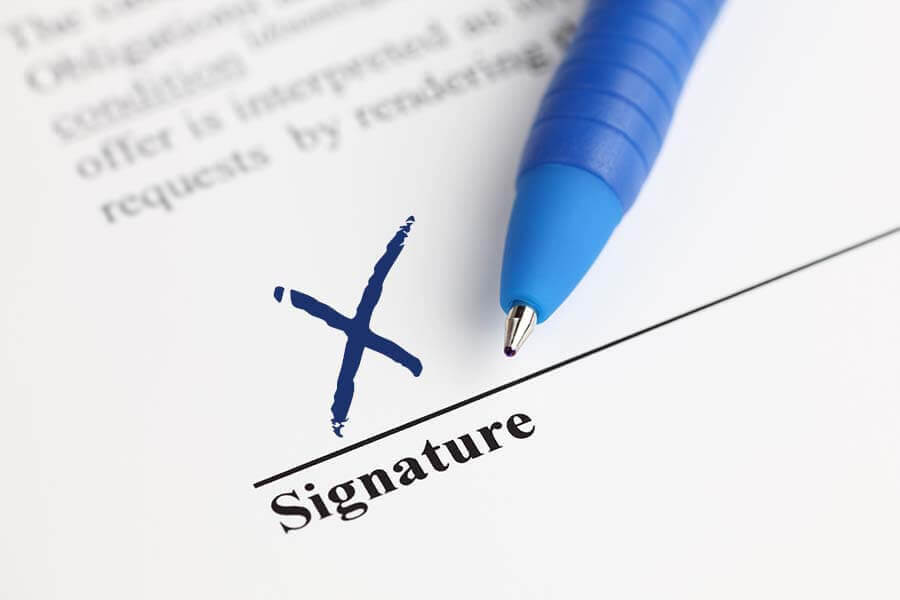
Updated 9-16-24. In the event your signer is unable to sign their name for any number of reasons, a “signature by mark,” such as an X, may be used instead. Here’s what you need to know.
What is a signature by mark?
A signature by mark is an alternative to writing a full signature. The signer instead makes a mark (such as an “X”) or other symbols on the document. Under the laws of many states, a mark is considered a signature and is treated as such.
What are the rules for notarizing a signature by mark?
As you’ll see in the discussion that follows, there are notable differences in how various states treat a signature by mark. It’s always important to consult your state’s laws, rules and official guidelines before notarizing a signature by mark.
Some states, including Indiana, Maine and Texas, along with states that have adopted the Revised Uniform Law on Notarial Acts (RULONA) such as Pennsylvania and Washington, do not mention or differentiate between a signature and a mark. In these states, the way a signer signs their name is immaterial and the signature, mark or scrawl may be notarized without a Notary taking any additional steps. Arizona’s Notary manual states that a Notary can notarize a thumbprint or an ‘X’ mark as a ‘signature’ or ‘subscription’, even when the signer is able to write and is not disabled.
There are additional steps a Notary must take to notarize a signature by mark in many states.
North Carolina and South Carolina require the Notary to write, “Mark affixed by (name of signer by mark) in presence of undersigned notary” below the mark on the document.
Montana law requires another individual to write the marker’s name near the mark in addition to signing the document.
Nebraska requires the Notary to write “Mark affixed by (name of signer by mark) in presence of (names and addresses of witnesses) and undersigned notary public.”
Arkansas, California, Illinois, and Oklahoma (for real estate conveyed or encumbered specifically in Oklahoma’s case) limit the use of signatures by mark to persons who lack the ability to sign their name or who have a physical impairment or other condition that prevents it.
Massachusetts, North Carolina and Nebraska specify the types of notarial acts that must be performed on a signature by mark (acknowledgments and jurats are universally identified, and other acts depending upon the law of the state).
Florida has statutory acknowledgment and jurat certificate forms for use when a Notary notarizes a mark.
Hawaii simply says the notarial certificate for a signature by mark should reflect that the individual signed with a mark.
Illinois has an acknowledgment certificate for an individual who signs using a mark.
What are the witness requirements for notarizing a signature by mark?
When notarizing a signature by mark, several states require one or more additional witnesses to be present when the mark is made. It is a common practice to have one of the witnesses print the signer’s name next to the mark on the document, and the witnesses may be required to sign the Notary’s journal entry.
In Arizona and Montana, only a single witness is required, but California and Illinois require two.
Arkansas requires at least one witness with no interest in the document.
Florida and Nebraska require two witnesses who must have no interest in the document being notarized.
North Dakota does not require witnesses but recommends having at least one present.
May a Notary witness a signature by mark?
Another question comes up: in the states that require a witness, can a Notary serve as a witness and also notarize the mark? Some states require the witnesses to have no interest in the document and others do not provide specific guidance on this issue. Unless your state specifically says Notaries may also act as a witness to a signature by mark, Notaries should not also serve as a signature by mark witnesses.
What about a signature stamp?
Many Notaries have asked if they can notarize a person’s stamped signature.
Indiana, Montana, New Hampshire and Oregon have statements in their Notary handbooks permitting Notaries to notarize a stamped signature used in place of a written signature.
Nevada has a statute (NRS 427A.755) that allows the use of a signature stamp if the signer is unable to write due to a physical disability.
New York also has a statute that defines a signature as including a mark made by stamp (Gen. Constr L 46).
Minnesota allows Notaries to notarize a signature made by a stamp (MS 645, Subd. 14).
David Thun is the Editorial Manager the National Notary Association.
Related Articles:
A guide for notarizing for physically impaired signers